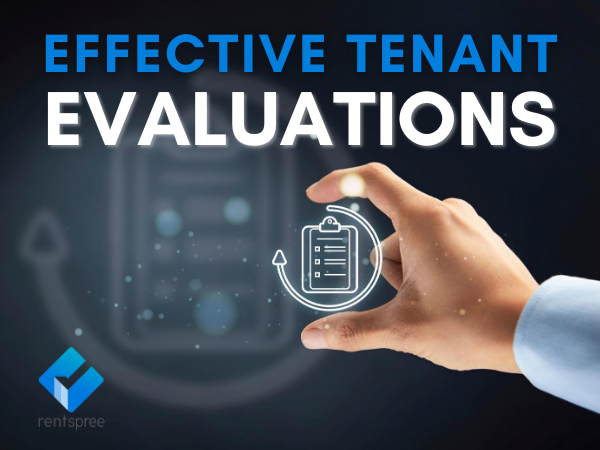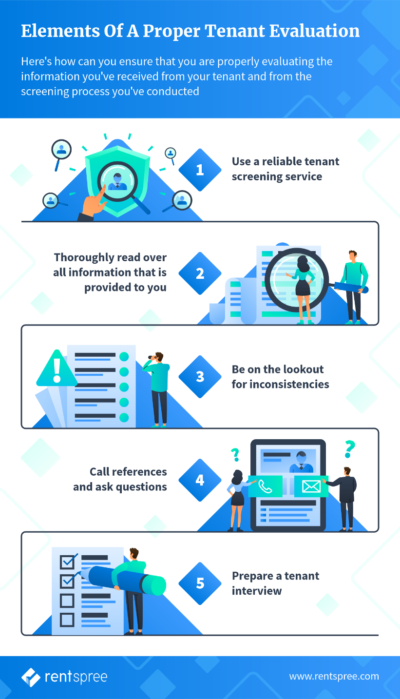Conducting an Effective Tenant Evaluation

Find out how to screen for your next tenant and what to look for in a thorough tenant evaluation.
You’ve marketed your rental property and a potential renter has reached out to you. What do you look for in order to determine whether or not this is someone whom you should trust with your property? Of course, you want to minimize carrying costs and the number of days you’re waiting for a tenant, but in order to take care of the property you represent and minimize headaches down the road, you’ll need to conduct a proper tenant evaluation.
The tenant evaluation process involves looking at a variety of factors, including your potential tenant’s rental history, financial situation, and even looking at the possibility of past criminal behavior. While you may be used to “going with your gut” when meeting with a new tenant, it’s important to get a good overview of their reputation and history.
In addition, a properly conducted tenant evaluation protects you from charges of unfair practices and violations of Fair Housing laws. It’s important to treat every potential tenant equally — asking the same questions and requiring the same information. A clearly delineated tenant evaluation can ensure that you check all of the same boxes for every individual applicant.
What should you ask for in order to conduct your tenant evaluation?
You’ll want to look at a number of factors and ask for some documentation in order to ensure that the information you get is correct. Here are some of the things to think about:
Financial Information
According to the Fair Credit Reporting Act (FCRA), you must require the same documentation and financial information from all of your potential renters. Here are some of the items you will want to evaluate:
- Credit reporting
- Judgments including liens, civil judgments, foreclosures, and bankruptcies
- Employment history and income, which may include self-employment income, alimony and child support, retirement income, court-ordered awards, and investment income
In addition to financial information, you will no doubt require some deposits and fees, including an application fee, damage deposit, pet deposit, and other items.
Criminal Background
You will want to conduct a criminal background check in order to learn more about your potential tenant’s history and behavior. Remember, you are not allowed to make decisions based on an arrest, but only on convictions.
If you find that the applicant was convicted of a crime, take into account how old the conviction is and what the offense was. While you want to take the information seriously, a one-time conviction on a minor charge decades ago may have very little bearing on the applicant’s current lifestyle and behavior.
Rental History
In many ways, this may be the most important part of your tenant evaluation. A positive report from prior landlords may help to offset other factors, like a low credit score or a non-violent criminal conviction. You’ll want to find out whether the applicant has a history of late rent payments, evictions, complaints, or breaking the terms of the lease agreement.
Don’t forget, you will need to conduct a tenant evaluation for every applicant who will be living in and paying rent for the rental property. This includes more than just spouses or significant others — it also includes adult children and roommates if they will be living in the home.
Evaluating the provided information
Some landlords and rental agents believe that if a tenant has provided the required information, they must have nothing to hide. However, in many cases, it is poor follow-up that allows a less-than-ideal renter to gain access to a property.
How can you ensure that you are properly evaluating the information you’ve received from your tenant and from the screening process you’ve conducted?

1. Use a reliable screening service.
A quality screening company like Rentspree provides a higher level of security and better, more thorough information than other screening platforms. Premium features like TransUnion’s ResidenceScore reporting and a 50-state eviction report ensure that you have the information you need to make better decisions on every application.
2. Read the provided information.
You may be tempted to skim the report for red flags, then assume that all is well — especially if you like the applicant. Take the time to really dig into the information you receive and read it thoroughly. At best, you’ll find that the potential tenant is as great as you thought. However, you may uncover game-changing information — and find yourself thanking your lucky stars that you conducted a thorough screening.
3. Look for inconsistencies.
A work history that doesn’t jibe with the tenant’s application. An eviction report that mentions an additional tenant. You may find things that don’t add up in the screening report, offering you a chance to ask for clarification from your potential tenant.
4. Call references and ask questions.
When you call that boss or former landlord, don’t just ask the standard verification questions. Dig a little deeper and ask if the landlord would rent to the tenant again. Ask the boss if he or she considers the tenant a responsible employee. Gain insight into the tenant that will help you make a better determination of his or her fitness.
5. Prepare a tenant interview.
Now that you have a thorough understanding of your tenant’s history, it’s time to conduct a tenant interview. This is your chance to clear up any inconsistencies and find out more about your tenant and his or her attitude. Is the potential renter a complainer? Does he or she ask for exceptions to your policies or make vague excuses for past behaviors? You’ll gain valuable insight into what it will be like to deal with the renter on a day-to-day basis through this process.
Now that you’ve conducted a thorough tenant evaluation, you can feel good about your choice, whatever it may be. Let Rentspree help you with the reporting and strategies you need to better match your rental property to that ideal tenant.
RentSpree is the preferred, online tenant screening provider of the Apartment Association of Greater Los Angeles. With it, you can put together a completed application package in one simple step. This includes a completed rental application, credit report and score, criminal background check, and national eviction history. RentSpree can handle the entire screening process for you and it takes just two minutes to start screening! Better yet, you can receive all reports back instantly at the property or at another time of your choosing. Visit https://aagla.rentspree.com to learn more.
